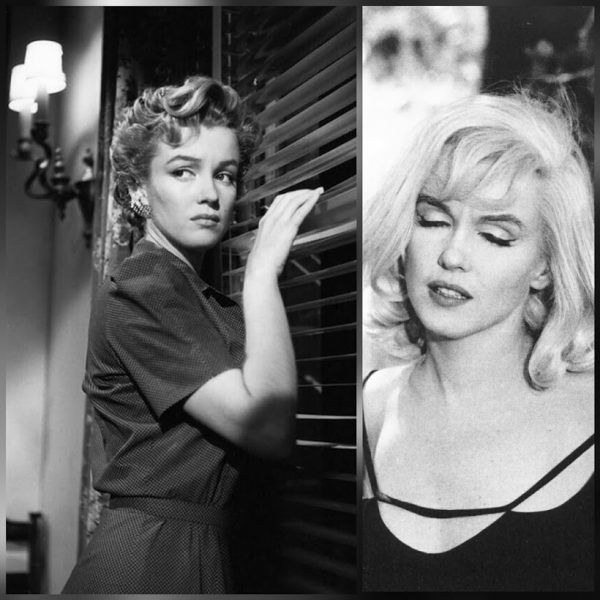
Although better-known for her high-glam comedies, Marilyn shone in dramatic roles when the opportunity arose. Over at NCN, The Misfits represents 1961 in an article listing the Best Western Films from the Year You Were Born, while at Classic Movie Hub, Gary Vitacco Robles continues his series on Marilyn’s movies with a look at Don’t Bother to Knock (you can read his take on Niagara here.)
“Four years before she set foot into the Actors Studio, Marilyn gives a Method Acting performance, beginning with her entrance. Nell enters the hotel’s revolving door in a simple cotton dress, low heels, a black sweater, and a beret. From behind, we see her outfit is wrinkled as if she had been sitting on the subway for a long time … Nell’s backstory is cloaked, and Monroe builds the character through use of her body in a manner studied with [Michael] Chekhov. She moves with hesitancy and scans her environment in a way that suggests she has not been in public for a long time.
According to [co-star] Anne Bancroft, Marilyn disagreed with both [director] Roy Ward Baker and acting coach Natasha Lytess on how to play the final climatic scene, ignoring their advice. ‘The talent inside that girl was unquestionable,’ Bancroft told John Gilmore. ‘She did it her way and this got right inside me, actually floored me emotionally.’
Nell Forbes is a fragmented personality with a blank expression. Sadness, fear, and rage register in Monroe’s face with credibility. She fluctuates from an introverted waif to someone who seems ruthless, even dangerous. Having worked with Chekhov, Monroe learned to delve deep into her own reservoir of painful memories and accessed her own natural talent for portraying vulnerability and madness. Employing Chekhov’s technique of physicality, she frequently held her waist as if the character were preventing herself from succumbing to madness. Perhaps Monroe’s mother, Gladys, served as inspiration. Gladys was diagnosed with Schizophrenia and institutionalized for long periods of time.
Monroe gives a stunning, riveting performance as a damaged woman, and suggests an alternative path her career might have taken if her physical beauty had not dictated the roles Fox gave her. Indeed, her comic performances were gems, which ultimately led to her legendary status, but what heights might she have achieved had she been allowed to experiment with more dramatic roles earlier in her career? Sadly, the film is rarely emphasized as a part of her body of work.
Arguably, Monroe effectively channeled her mentally ill mother and gives a believable performance as a vaguely written character in a script without any description of her personality. Monroe later told friend Hedda Rosten that Don’t Bother to Knock was one of her favorite films and considered Nell her strongest performance.”